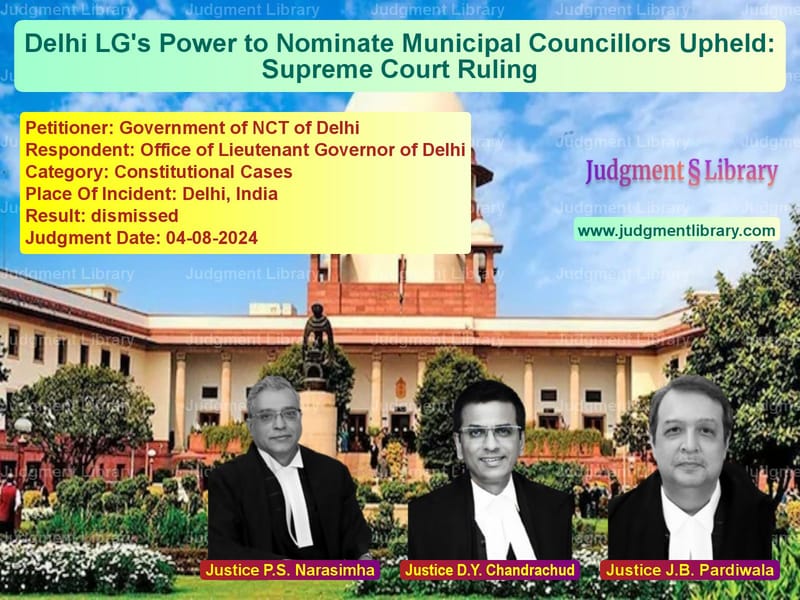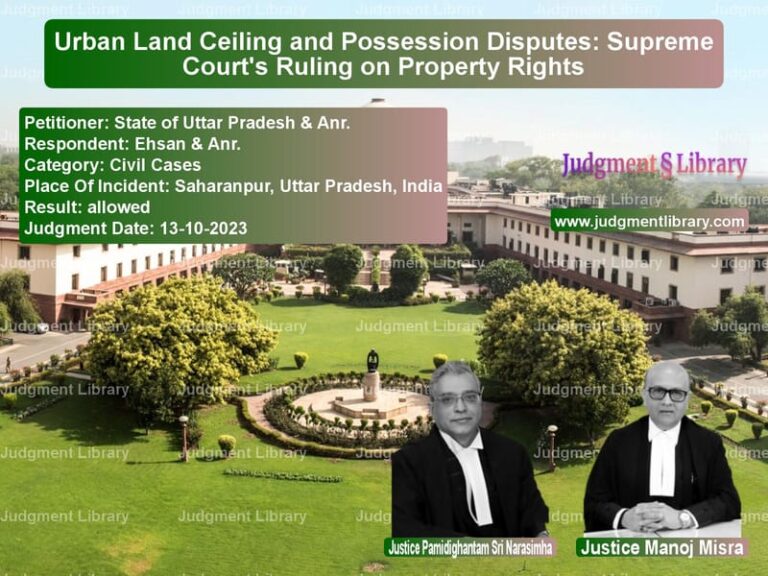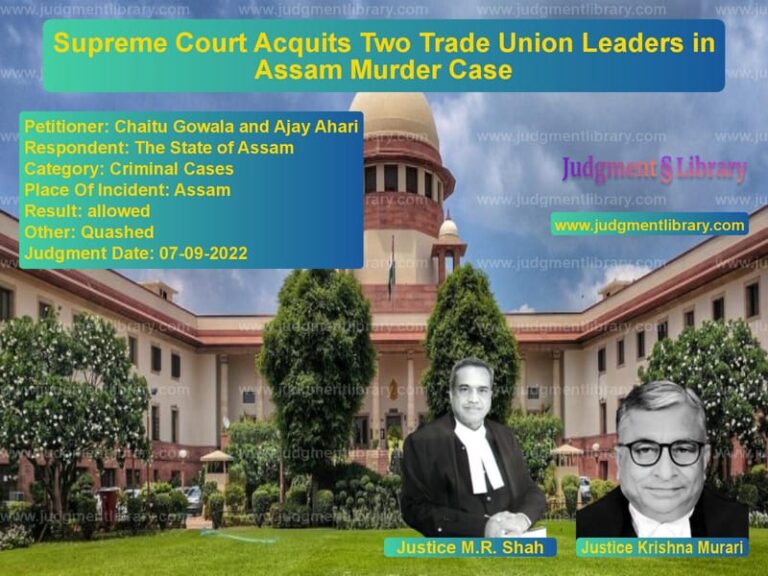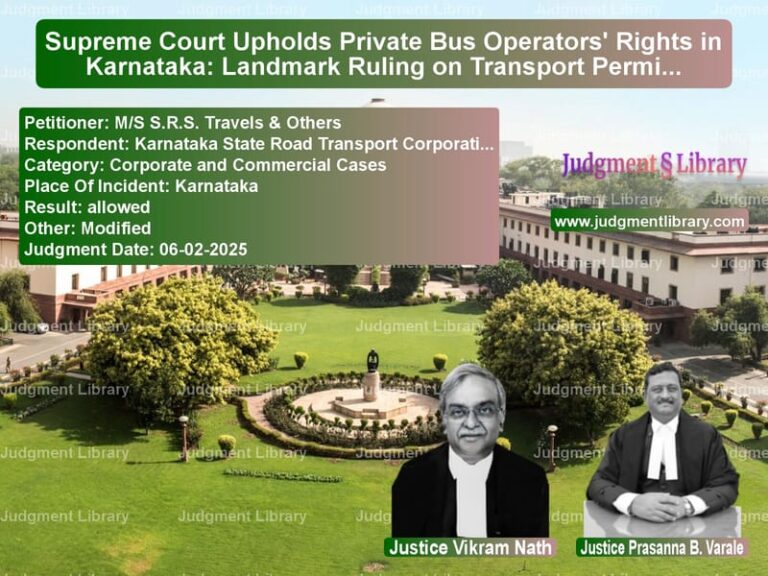Delhi LG’s Power to Nominate Municipal Councillors Upheld: Supreme Court Ruling
The Supreme Court of India, in the case Government of NCT of Delhi vs. Office of Lieutenant Governor of Delhi, has ruled that the Lieutenant Governor (LG) of Delhi has the power to nominate members to the Delhi Municipal Corporation (DMC) without seeking the aid and advice of the Council of Ministers of the National Capital Territory of Delhi (NCTD). This landmark judgment resolves the dispute over the extent of the LG’s discretionary powers under Article 239AA of the Constitution.
Background of the Case
The case arose when the LG nominated ten members to the DMC under Section 3(3)(b)(i) of the Delhi Municipal Corporation Act, 1957 (DMC Act). The Government of NCTD, led by the Aam Aadmi Party (AAP), challenged the nominations, arguing that the LG was constitutionally bound to act on the advice of the Council of Ministers. The government filed a writ petition under Article 32, seeking to quash the nominations and direct the LG to act in accordance with the elected government’s advice.
Legal Issues Considered
The Supreme Court examined the following key legal questions:
- Does the LG have the power to nominate members to the DMC independently?
- What is the correct interpretation of Article 239AA(4) regarding the LG’s discretionary powers?
- Does the statutory scheme of the DMC Act indicate that the nomination power vests solely with the LG?
- How should the balance of power between the NCTD government and the LG be maintained?
Arguments by the Petitioner (Government of NCTD)
The Government of NCTD, represented by Senior Advocate Dr. Abhishek Manu Singhvi, contended:
- The LG is required to act on the aid and advice of the Council of Ministers in all matters except where discretion is explicitly provided by law.
- Section 3(3)(b)(i) of the DMC Act does not expressly grant discretion to the LG in nominating members.
- The Constitution Bench rulings in State (NCT of Delhi) v. Union of India (2018) and Government of NCT of Delhi v. Union of India (2023) clarified that the LG must act on the advice of the Council of Ministers in all matters where the Delhi Assembly has legislative competence.
- The LG’s decision to act unilaterally was contrary to the established practice of over 30 years, where nominations were made based on ministerial advice.
Arguments by the Respondent (Office of the Lieutenant Governor of Delhi)
The LG’s office, represented by Additional Solicitor General Sanjay Jain, countered:
- Article 239AA(4) permits the LG to act independently when required by law.
- The DMC Act explicitly vests the nomination power in the LG, indicating that it is a statutory function, not an executive one.
- The provision for nomination was introduced in 1993, after the enactment of Article 239AA, meaning that Parliament deliberately assigned this role to the LG.
- The LG’s nominations were in line with the Constitutional framework and did not violate the principle of elected government supremacy.
Supreme Court’s Observations
1. Textual Interpretation of Section 3(3)(b)(i)
The Court ruled that the language of Section 3(3)(b)(i) clearly vests the power of nomination in the LG:
“The provision states that ten persons with special knowledge in municipal administration shall be nominated by the Administrator. The statutory mandate is explicit and leaves no room for ministerial interference.”
2. Legislative Intent Behind the 1993 Amendment
The Court examined the legislative history of the DMC Act and noted:
“The nomination provision was introduced in 1993, post the enactment of Article 239AA. This indicates a conscious decision by Parliament to place this power with the LG.”
3. LG’s Discretion Under Article 239AA(4)
The Court emphasized that Article 239AA(4) permits the LG to act in his discretion when required by law:
“The text of Article 239AA(4) states that the LG shall act on the aid and advice of the Council of Ministers except where he is required by law to act in his discretion. The DMC Act falls within this exception.”
4. Comparison with State Governors
The Court rejected the argument that the LG’s role is identical to that of a State Governor under Article 163:
“Unlike a State Governor, the LG’s discretionary power is specifically linked to statutory mandates. The LG does not have general discretion but only acts independently where explicitly authorized.”
Final Judgment
The Supreme Court ruled:
- The LG’s power to nominate members to the DMC is a statutory function under the DMC Act.
- The LG is not required to seek the aid and advice of the Council of Ministers for nominations under Section 3(3)(b)(i).
- The writ petition challenging the nominations is dismissed.
- The notifications issued by the LG on 03.01.2023 and 04.01.2023 remain valid.
Implications of the Judgment
This ruling has significant implications for the governance of Delhi:
- Reaffirms LG’s Statutory Role: The judgment clarifies that certain powers assigned by law to the LG can be exercised independently.
- Limits Ministerial Oversight: The decision establishes that ministerial advice is not required where Parliament has expressly vested a function in the LG.
- Strengthens Executive Clarity: Provides clear guidelines on the interpretation of Article 239AA and the distribution of powers in NCTD.
- Sets a Precedent: Future disputes over the LG’s discretionary powers will likely be evaluated in light of this ruling.
The Supreme Court’s decision in Government of NCT of Delhi vs. Office of Lieutenant Governor of Delhi reinforces the balance of power between elected governments and statutory authorities while ensuring compliance with Constitutional mandates.
Petitioner Name: Government of NCT of Delhi.Respondent Name: Office of Lieutenant Governor of Delhi.Judgment By: Justice P.S. Narasimha, Justice D.Y. Chandrachud, Justice J.B. Pardiwala.Place Of Incident: Delhi, India.Judgment Date: 04-08-2024.
Don’t miss out on the full details! Download the complete judgment in PDF format below and gain valuable insights instantly!
Download Judgment: government-of-nct-of-vs-office-of-lieutenant-supreme-court-of-india-judgment-dated-04-08-2024.pdf
Directly Download Judgment: Directly download this Judgment
See all petitions in Legislative Powers
See all petitions in Public Interest Litigation
See all petitions in Separation of Powers
See all petitions in Judgment by P.S. Narasimha
See all petitions in Judgment by Dhananjaya Y Chandrachud
See all petitions in Judgment by J.B. Pardiwala
See all petitions in dismissed
See all petitions in supreme court of India judgments August 2024
See all petitions in 2024 judgments
See all posts in Constitutional Cases Category
See all allowed petitions in Constitutional Cases Category
See all Dismissed petitions in Constitutional Cases Category
See all partially allowed petitions in Constitutional Cases Category







